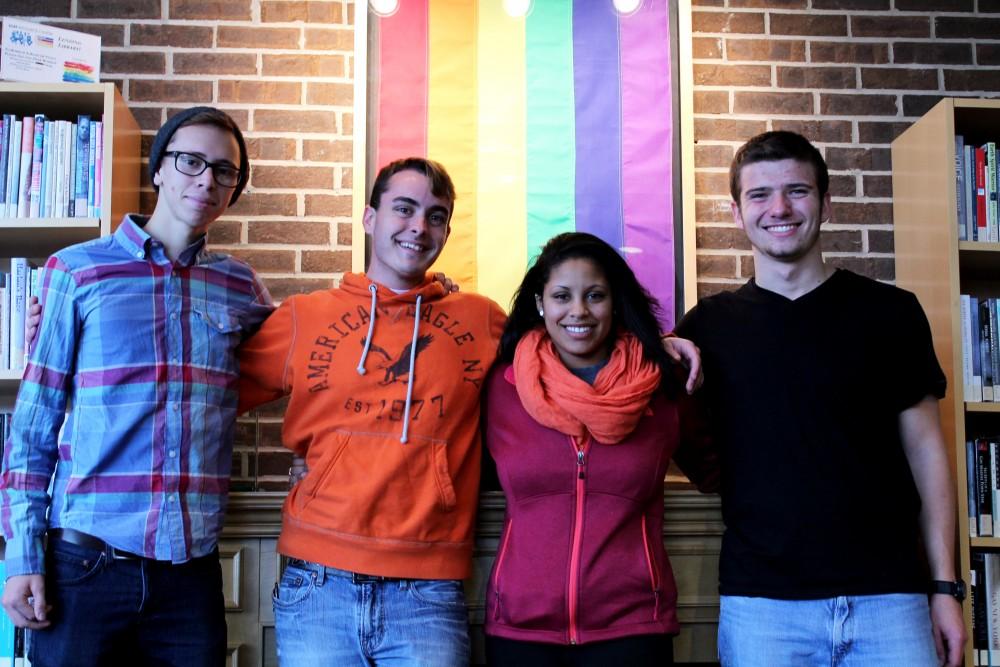Students respond to federal court decision

GVL / Emily Frye Brody Cragg (left), Sean Diaz (left center), Annika Gray (right center), and Levi Ryfiak (right)
Nov 13, 2014
A Michigan constitutional amendment that banned same-sex marriage since 2004 was overturned in March, allowing about 300 couples to marry legally based on equal protection under the law. The U.S. Sixth Circuit Court of Appeals overturned this ruling on Nov. 6, upholding Michigan’s gay marriage ban.
Colette Seguin-Beighley, director of the LGBT Resource Center at Grand Valley State University, said the court unfortunately continues to rule in favor of discrimination.
“We’re on the wrong side of history,” Seguin-Beighley said. “Michigan is like the South during the Civil Rights Era because we have written discrimination into our constitution.”
The 1976 Elliott-Larsen Civil Rights Act outlawed discrimination in employment, housing and public accommodations based on a variety of things, from sex and race to height and weight. However, Seguin-Beighley said it leaves some important things out.
“Marriage will bring immediate relief to many families, but it will not address some of the most difficult issues facing the queer community, such as homelessness and discrimination in housing and employment,” she said. “At GVSU, we have excellent protections in place in policies that protect around sexual orientation and gender identity or expression.”
Leslie Boker, a GVSU senior and member of Out ‘N’ About, said people who oppose LGBT rights are often doing so in an attempt to impose gender conformity on others.
“Society punishes and delegitimizes gay, bi and trans people and relationships,” Boker said. “That reflects on all of us. The homophobia and transphobia that make GVSU feel uncomfortable or unsafe for LGBT students spring from the cultural impulse to shove us back into the gender boxes we are perceived to have escaped from.”
Seguin-Beighley acknowledged that there is a lot of opposition to same-sex marriage in Michigan, but she said there is still hope for the ban to be lifted in the future.
“We value inclusiveness here at GVSU. That’s who we are as an institution,” she said. “As a society, people grow and change, and their understandings grow and change.”
The same is true for marriage equality, Boker said.
“The Michigan government is legislating unjust ideas about gender conformity to make sure people stay inside the lines,” Boker said. “There is no smooth, inevitable path toward equal rights, but there has been an enormous push for this cause, especially from mainstream gay interests.”
Matthew Nugent, a GVSU senior and president of the College Republicans student organization, said he agrees with the circuit court’s ruling, believing that the 2004 constitutional amendment to ban same-sex marriage should be upheld.
“Keeping social issues outside of the courts and leaving it with the political process is better for democracy,” Nugent said. “If the people of Michigan want to bring this up for referendum again and legally recognize same-sex marriages, then there is a process for it.”
Boker agreed with Seguin-Beighley that maintaining the ban shows Michigan’s active discrimination against the LGBT community.
“Marriage equality is a highly visible cause because it’s an easily understood and concrete goal,” Boker said. “Looking at the big picture, I’d say that marriage equality itself is less important than improved understanding and acceptance for LGBT identities. If that understanding were there, equality would naturally follow.”
Nugent said the Republican position supports the right of the state, not the federal government, to determine who can marry legally. The party has historically supported traditional marriage.
“It will affect GVSU students either when the state or the courts will put a stay on the issuance of marriage licenses to same-sex couples,” he said. “We will understand the true impact of this decision if and when the United States Supreme Court takes up this issue.”

























